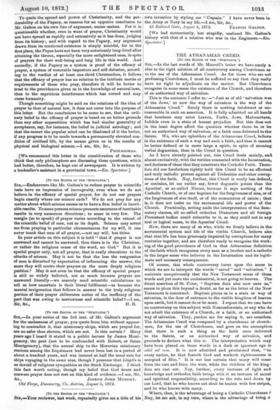[TO THE EDITOR OF THE "SPECTATOR. "] SIR,—Endeavours like Mr. Galton's
to reduce prayer to scientific tests have an impreasion of incongruity, even when we do not believe in the efficacy of special prayer, for do not our prayers begin exactly where our science ends? We do not pray for any matter about which science causes us to have a firm belief in inevit- able results. To some persons science presents assurance of inevitable results in very numerous directions ; to some in very few. The margin (so to speak) of prayer varies according to the extent of the scientific belief of men, not so its depth. Science may arrest me from praying in particular circumstances for my will, it can never touch that sum of all prayer,—not my will, but thine.
In your article on this subject it is held " that if prayer is not answered and cannot be answered, then there is in the Christian, or rather the religious sense of the word, no God." But it is special prayer only, not all prayer, that is really obnoxious to the attacks of science. May it not be that the less the resignation of men is disturbed by expectation of influencing the answer, the more they will centre their prayers on the more deeply religious petition? May it not even be that the efficacy of special prayer is still so widely believed, not so much because prayers are answered literally—we scarcely need scientific calcidations to tell us how uncertain is their literal fulfilment—as because the mental invigoration that follows in answer to the truly religious portion of their prayer obliterates notice of the inefficacy of the part that was owing to narrowness and scientific belief ?—I am,
































 Previous page
Previous page